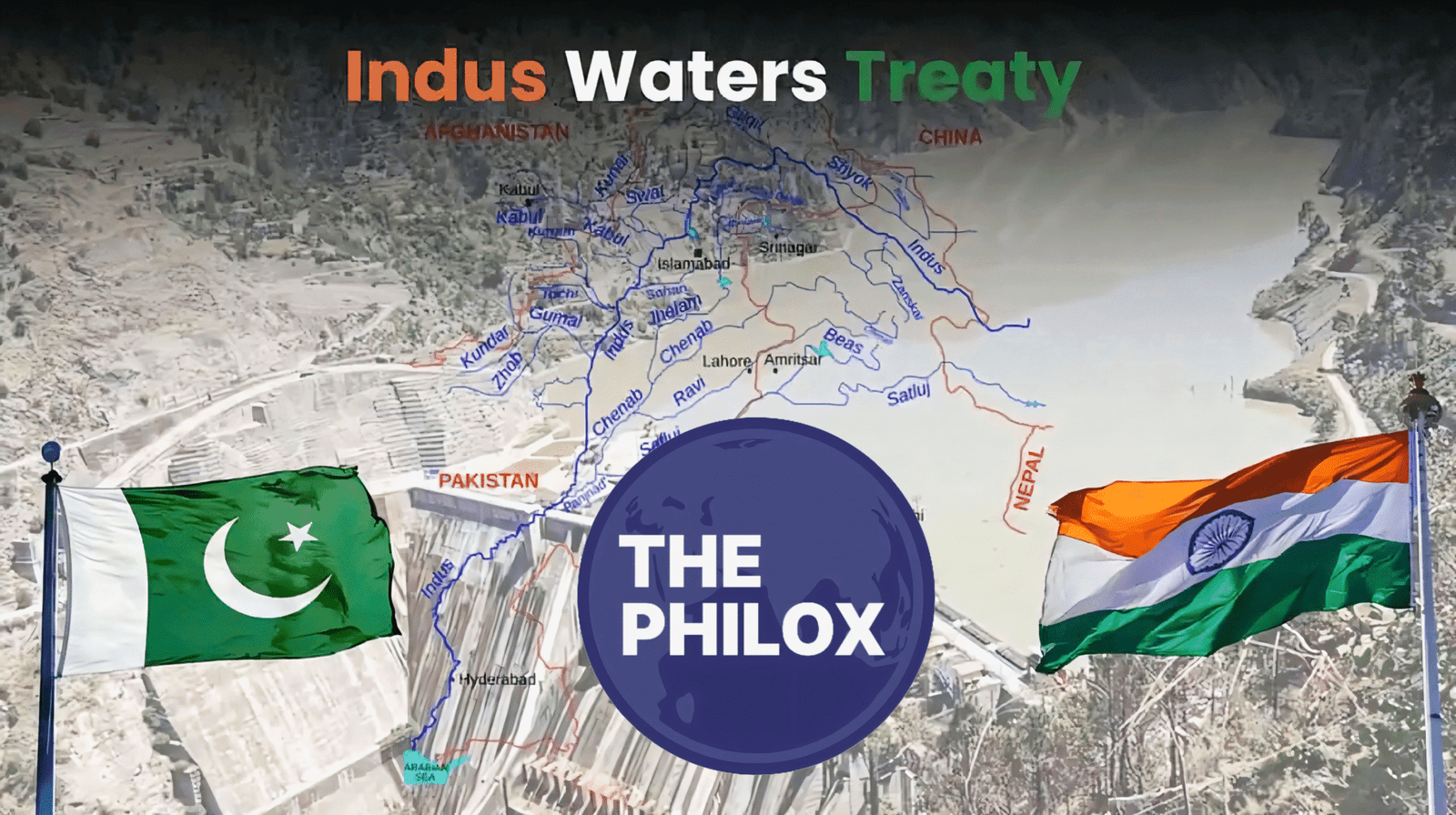Significantly between India and Pakistan, the Indus Waters Treaty (IWT) controls how water from the Indus River system is used across both nations. Signed in 1960, this treaty—which the World Bank helped to draft—aimed to create a framework for the peaceful sharing and use of water between the two countries. Both nations depend heavily on water, hence the pact has been rather helpful in preventing more general conflicts arising from disagreements over water use.
The Treaty’s Framework
The six rivers of the Indus River system are split in two groups by the treaty: Eastern Rivers and Western Rivers.
Among Eastern Rivers are the Ravi, Beas, and Sutlej rivers. India has complete authority over the use of these rivers, hence it can use the water for irrigation, drinking, and other needs free from Pakistani limitations.
Western Rivers: Among these are the Indus, Jhelum, and Chenab rivers. Pakistan holds main rights to the waters of these rivers and control over them. India may only make use of the water from these rivers under particular circumstances, mostly for agriculture and hydroelectric power generating. India is not permitted, therefore, to store or divert water from these rivers in ways that would greatly impact Pakistan’s water resources.
Comprising representatives from both India and Pakistan, the Indus Waters Treaty created the Permanent Indus Commission. This body supervises the treaty’s execution and offers a forum for settling conflicts and water use-related problems.
the Value of the Treaty
Maintaining stable relations between India and Pakistan, two nations with years of political unrest and military wars underlined, the Indus Waters Treaty has been an indispensable instrument. Notwithstanding these challenges, both countries have generally followed the pact and the shared water resources have not been a main cause of strife.
One of the main features of the pact is its capacity to stop conflicts over water from developing into full-fledged wars. Given that both India’s and Pakistan’s economies revolve mostly on agriculture, food production depends on water supplies. The pact guarantees that both countries have access to their fair part of river water, therefore preserving stability in the area.
The treaty offers means for the settling of conflicts as well. Either nation can bring the situation before the Permanent Indus Commission for review should they feel the terms of the treaty are being broken. Should it be required, the matter can be sent for arbitration to a neutral third party, say the World Bank.
The Pahalgam Terror Attack: Effects
A terrorist strike in the Baisaran Valley close to Pahalgam in Jammu and Kashmir claimed at least 26 lives and injured over 20 others on April 22, 2025. The Resistance Front (TRF), connected to extremist group Lashkar-e-Taiva based on Pakistan, claimed the attack. India claimed Pakistan supported the assailants, while Pakistan refuted any role at all.
India responded with a sequence of reprisals following this terrible attack, one of which was suspending the Indus Waters Treaty. This action signalled a more severe reaction to Pakistan’s claimed backing of terrorism, hence escalating tensions between the two countries.
Response of India to the Terror Attack
India answered the Pahalgam terror incident with quickness and force. Apart from suspending the Indus Waters Treaty, India kicked military men and diplomats from Pakistan from the nation. The Indian government also limited trade with Pakistan and travel via the Wagah-Attari border, the principal land crossing separating India from Pakistan.
Given that the pact had been a pillar of Indo-Pakistani ties for more than six decades, suspending it was a remarkable turn-about. India claimed that suspending the treaty was a required action to let Pakistan know it would not accept acts of terrorism coming from its territory. This action also sought to convey to Pakistan that India would react forcefully to assaults on its people.
Furthermore causing questions about the possibility of war over water supplies was the suspension of the pact Millions of people in both nations depend mostly on the Indus River system for agriculture and other water demands, hence changing the flow of water could have disastrous effects.
Pakistan’s Response to India’s Activities
When India decided to suspend the Indus Waters Treaty, Pakistan responded forcefully. Pakistan responded by closing its airspace to Indian planes and driving Indian diplomats from the nation. Furthermore suspended by Pakistan was the 1972 Simla Agreement, a peace pact meant to offer a framework for the two countries’ conflict resolution.
Another major step that severely tested relations was the closing of the Wagah-Attari border, which had been a critical connection for trade and communication between India and Pakistan. Pakistan also said it would stop trading with India, effectively isolating itself economically from its neighbor.
Pakistan’s actions mirrored the gravity with which it saw India’s choice to suspend the treaty. The action brought attention to the precarious nature of ties between the two nations since both sides seemed to have a hardline attitude on important problems.
The Need of Water Safety
Long a major concern in South Asia, water security has India and Pakistan’s main water source is the Indus River system, hence any disturbance in its flow might have quite serious effects. In Pakistan, the Indus, Jhelum, and Chenab rivers’ water is mostly relied upon in agriculture. Any disturbance in the availability of water from these rivers can result in agricultural failures, water scarcity, and economic instability.
The situation is equally noteworthy in India, especially in the northern parts of the nation where Eastern Rivers (Ravi, Beas, and Sutlej) are vital for irrigation and drinking water. India is nonetheless impacted by any disturbance to the larger river system even if it has more freedom in using the Eastern Rivers.
The treaty’s suspension sparked worries about how tensions over water can turn into fresh cause of strife. Although both nations depend on the river system, they also have the ability to influence one another’s water availability, therefore creating a possible flashpoint in their continuous conflict.
Global Crisis Reactions
The rising tensions between India and Pakistan cause great worry among the world community. Leaders from the United States and the United Nations among others urged both nations to open communication and work toward a peaceful crisis resolution. While the United Nations denounced the terrorist act and advised moderation from all sides, the United States called for both countries to strive toward a “responsible solution.”
Particularly when concerns like water security are involved, the international world has sometimes acted as a mediator between India and Pakistan in disputes. Particularly the Indus Waters Treaty has been considered as a paradigm for peaceful collaboration over shared resources; its suspension is a major loss in regional diplomacy.
The Treaty’s Future:
Future of the Indus Waters Treaty is still unknown. The suspension of the treaty might be only temporary or indicate the start of a more general review of the deal. Given the significance of the Indus River system to both nations, the suspension of the treaty emphasizes the hazards of depending on agreements that can be readily interrupted by political or security issues.
India and Pakistan could have to investigate fresh approaches of handling their common water supplies going ahead. Although the treaty offers a structure for collaboration, its suspension implies that even the most solid accords may be undermined by outside events as political conflicts and terrorism. If both nations want to prevent more escalation and guarantee that water security stays constant for their people, dialogue and collaboration will be very vital.
Final Thought
For more than sixty years, the Indus Waters Treaty has been pillar of India-Pakistan ties, helping to prevent water-related problems from spiraling into more general strife. But the current treaty suspension following the Pahalgam terror assault emphasizes how precarious this accord is. The circumstances emphasizes the importance of ongoing communication and cooperation between India and Pakistan to control common resources and prevent more escalation. Both countries will have to negotiate their differences and make sure their people will always have access to this essential resource in an area where water security is crucial.




